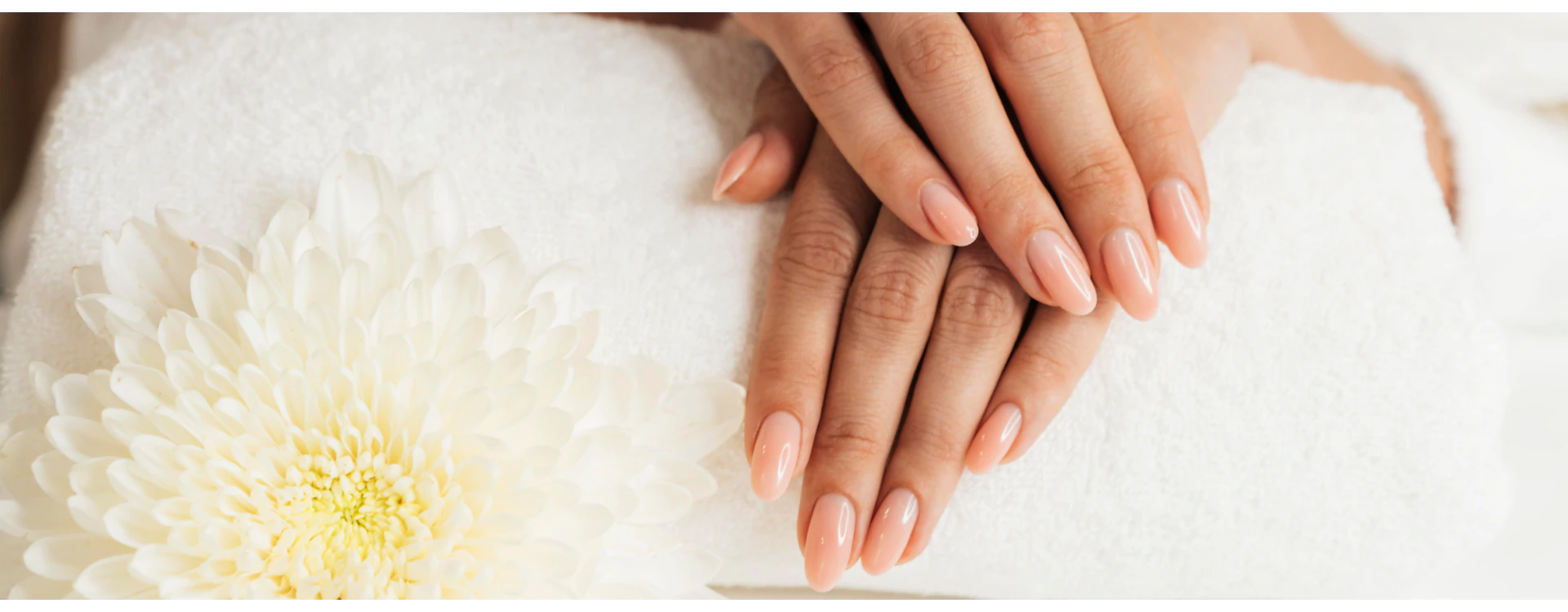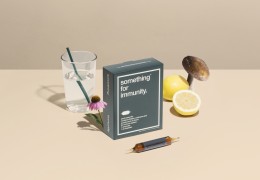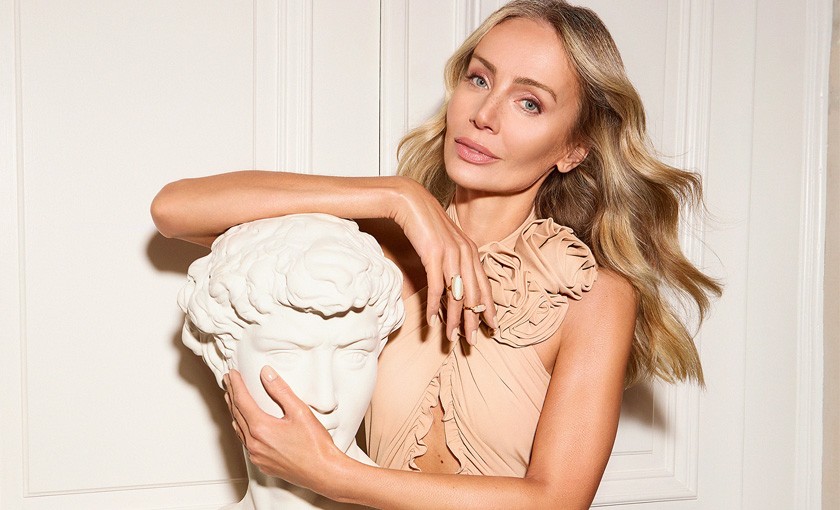Vitamin H - sound familiar? Probably not, since we mainly focus on those at the very beginning of the alphabet. But B7 is already much closer to us, and the name biotin... ding, ding, we have a winner. Yes, it's a compound that has gained immense popularity in supplementation in the context of hair, skin and nail care. But the effects of vitamin B7 go deeper. What is biotin? How does it work and when is it worth supplementing? How does biotin deficiency manifest itself? We will focus on these questions to help you better understand this important vitamin for the body.

Biotin - what is it?
Biotin is a water-soluble vitamin that belongs to the B vitamin complex. Our body cannot synthesize it in sufficient amounts, so we need to supply it with food or supplements. It acts as a coenzyme - it supports the action of many enzymes responsible for energy metabolism, i.e. how efficiently your body uses the nutrients you provide yourself with during meals. It is soluble in water, so excess is excreted in the urine. This reduces the risk of overdose.
Biotin - properties
Biotin has a multidirectional effect - not only on hair. It helps convert fats, proteins and carbohydrates into energy. This is why it is so important for physically active people concerned with metabolic balance. It is also crucial for people on a diet. Is that all there is to it? Of course not. Biotin also supports the nervous system, like all B vitamins. Its deficiency can therefore take a toll on your mood and concentration. It also supports the immune system, as it participates in the processes that regulate the immune response. Of course, it is essential for the health of your hair, skin and nails. It reduces hair loss, restores hair shine, soothes skin inflammation and improves skin elasticity, and reduces nail brittleness. Biotin is therefore essential - not just for hair, but for the entire body, which functions less well without it. After all, the body is a mechanism that needs to be taken care of comprehensively.
Causes and symptoms of biotin deficiency
Although biotin deficiency does not happen often, it can occur, for example, in people on a deficiency diet, people with malabsorption disorders, pregnant women or seniors. It can also appear in people with celiac disease or Crohn's disease. Alcohol abuse or intensive antibiotic therapy also make vitamin B7 deficiency more likely. The most common symptoms are hair loss, brittle nails, dry, flaky skin - yes, you'll recognize the quickest way to tell if you're deficient in biotin. But the symptoms don't stop there. You may also notice concentration problems, mood deterioration, fatigue, apathy, muscle aches. In such situations,
biotin - a supplement with a high content of this ingredient - will be a support, but not the answer. Together with your doctor, consider where your problem is coming from and how it can be fixed.
New
Best-seller
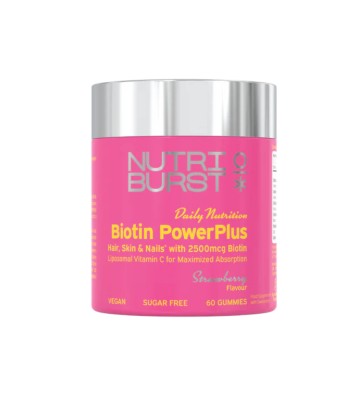 Skin, Hair, Nails
Skin, Hair, Nails
-10%
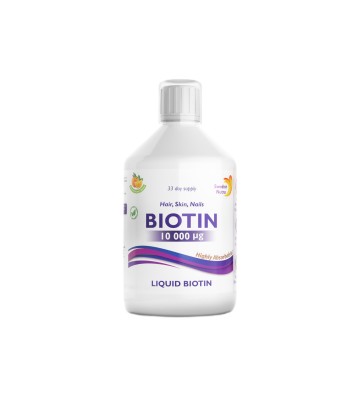 Hair
Hair
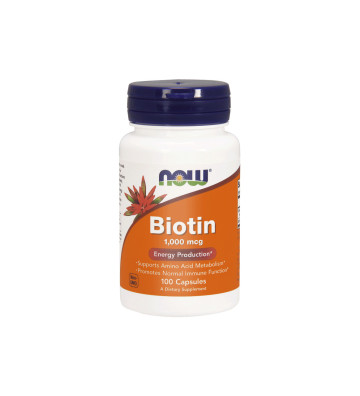 Skin
Skin
-10%
Biotin 1000 µg (1 mg) 100 pcs.
Regular price
25.00 zł
Price
22.50 zł
The lowest price in the 30-day period before the reduction: 22.50 zł
0.23 zł / Saszetka
 Skin, Hair, Nails
Skin, Hair, Nails
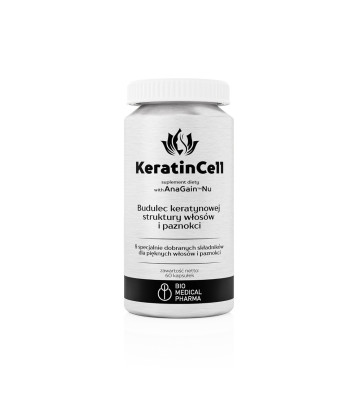 Hair and nails
Hair and nails
KeratinCell 60 pcs.
Price
99.00 zł
The lowest price in the 30-day period before the reduction: 89.10 zł
1.65 zł / Unit
Availability: Out of stock
What is biotin found in?
Biotin is found in many foods - both animal and plant sources. The best natural sources of biotin include: eggs, especially yolks, liver and other offal, beer yeast, fatty fish such as salmon. However, vegans and vegetarians need not worry - sunflower seeds, almonds, walnuts, soybeans, legumes, whole-grain cereal products, and vegetables such as spinach, yams and cauliflower also contain vitamin B7. So you can meet your body's biotin needs from your diet, of course, if you are not a person prone to deficiency. Sometimes, however, it is worth introducing supplementation. When?
Biotin - properties of the supplement and when to reach for it.
The supplement replenishes deficiencies, but also makes us support the health of our hair, skin and nails. Supplementing with about 1000 µg of biotin is prevention and supplementation of deficiencies. 5000 µg is already targeted therapy. It is primarily used to treat hair loss, such as androgen-induced hair loss. Studies indicate that biotin supplementation can promote hair restoration or growth. Although biotin does not treat alopecia of any cause, it is used supportively in trichological therapies. In addition, biotin is involved in the synthesis of keratin - the building block of nails, hair and skin. A high dose of this vitamin can therefore be helpful in the fight against brittle nails [1], cracked lip skin, AD or even acne.
However, it is worth remembering that the best results are obtained by people with known biotin deficiency - after antibiotic therapy, pregnancy, with diseases that cause absorption problems. Biotin supplementation is also worthwhile if you are struggling with chronic stress and fatigue.
Supplements for men and
women struggling with these types of problems often contain B vitamins.
How to choose the right biotin supplement?
When choosing a biotin supplement, pay attention first and foremost to its content tailored to your needs. The supplement may contain smaller or larger amounts of this vitamin. But it's not just the biotin that matters. Whether it works on your hair or other parts of your body, it should have supportive substances in it, such as zinc, silica, vitamin B5. The form of administration also matters - mainly for your convenience. Decide on the one that is best for you and will make supplementation easier. Also pay attention to quality and composition. Avoid those products that have a fair amount of artificial additives.
Biotin is an ingredient that is extremely important for our beauty and health. Although most of us get enough of it from our diet, there are situations when supplementation can bring real benefits - improving skin condition, strengthening hair and nails, and supporting metabolism and the nervous system. If you're noticing deficiency symptoms in yourself, it's worth considering supplementation - preferably consciously and based on your body's real needs.


